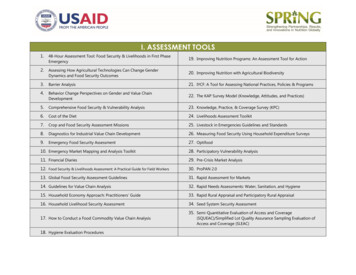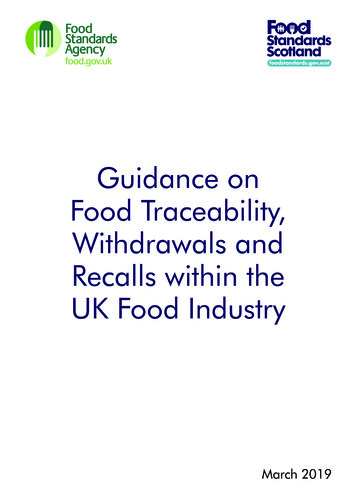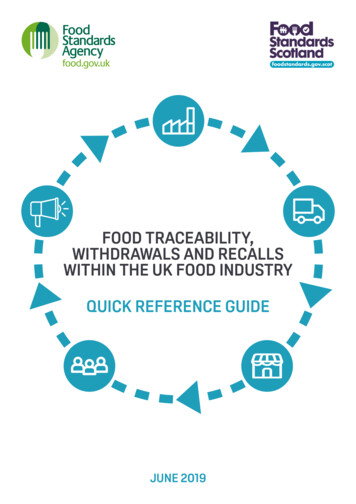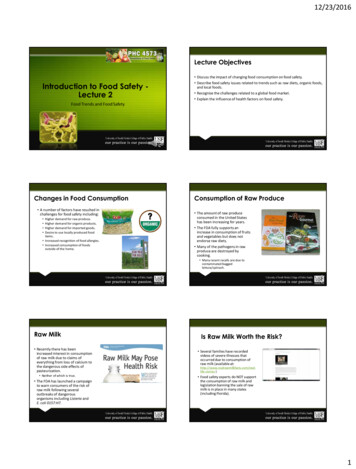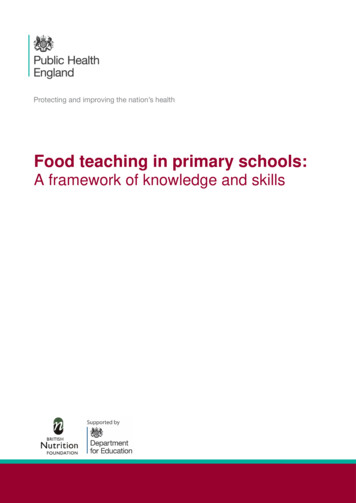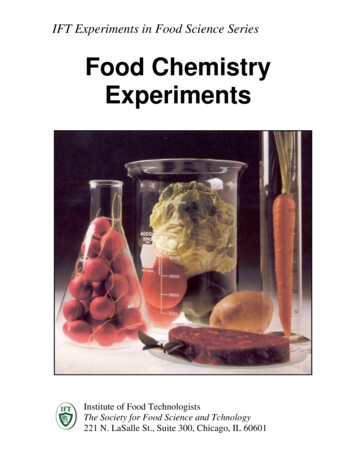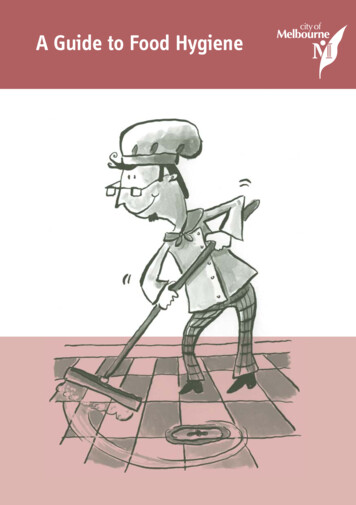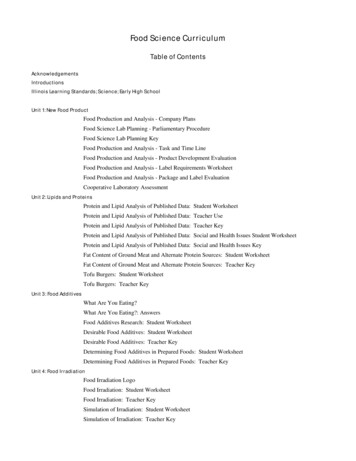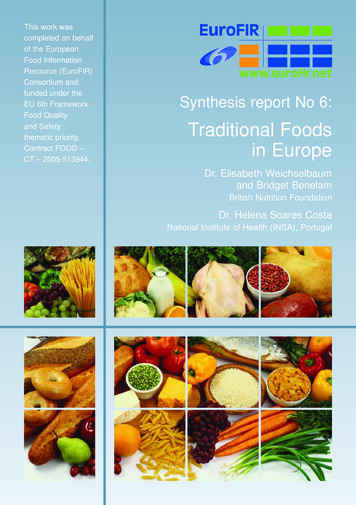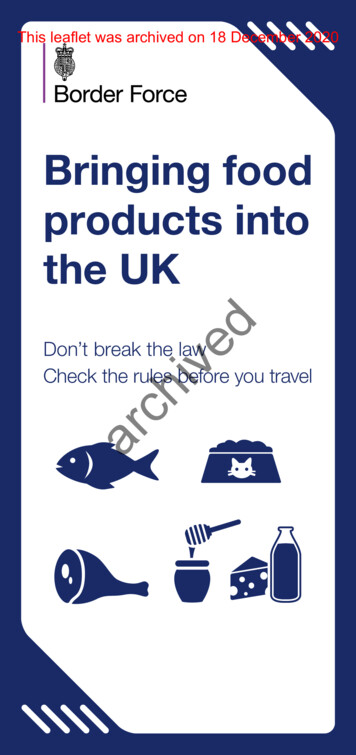
Transcription
This leaflet was archived on 18 December 2020edBringing foodproducts intothe UKarchivDon’t break the lawCheck the rules before you travel1
vedThis leaflet was archived on 18 December 2020There are very strict controls on what foodAbout this leafletproducts you can bring into the EuropeanUnion (EU). This is because food productsThis leaflet is not comprehensive and willcan carry pests and diseases, which canonly give you a summary of the rules.devastate our environment, agriculturalBecause pests and diseases can occurand horticultural industries. The Foot andvery suddenly, these rules can change atMouth Disease outbreaks in 2001 andany time and at short notice.2007 showed what damaging effects ananimal disease can have on communities,For up-to-date information, contact thebusiness and the economy.Department for Environment, Food andRural Affairs (Defra) – their contact detailsIf you are travelling from a country withinare on the back of this leaflet.the EU (see the list on page 4), youmay bring in any meat, dairy or otherSending or receiving your items by postanimal products. If you are travellingfrom a country outside the EU, manyAll the rules described in this leaflet alsoanimal products are banned – with a fewapply to any items you send or receive byexceptions – see pages 5 to 8.post (including those ordered online).archiPlease note that what you may bring independs on where you are travelling from(i.e. from another EU country or fromoutside the EU), and not where the foodproduct was produced or packaged.Working in partnership with23
This leaflet was archived on 18 December 2020Travelling from a country outside theTravelling from a country within theEuropean Union (EU)European Union (EU)If you are travelling from a country withinthe EU (see the list below), you may bringin any meat, dairy or other animal products.Meat and dairy productsYou may bring in a limited quantity of other animalproducts, such as fish, bivalves, honey and eggs.Please check pages 6 to 8. For further detailsabout permitted products, contact Defra – theirdetails are on the back of this leaflet.vedAny other animal productfor example fish, bivalves (such as oysters,mussels or clams), honey and eggs.If you are travelling from a country outside the EU,you cannot bring any meat or dairy products intothe UK unless you are travelling from the FaroeIslands, Greenland or Iceland, when you are alloweda combined weight of up to 10kg per person.If you have specific questions about fish, shellfishor bivalve products, contact the Food StandardsAgency – their contact details are on the back ofthis leaflet.chiDon’t break the law, check the rules beforeyou travel.arEU Countries are:Austria, Belgium, Bulgaria, Croatia, Cyprus*, CzechRepublic, Denmark, Estonia, Finland, France, Germany,Greece, Hungary, Ireland (Republic of), Italy, Latvia,Lithuania, Luxembourg, Malta, Netherlands, Poland,Portugal (including Madeira), Romania, Slovakia,Slovenia, Spain, Sweden and the UKFor these purposes, EU countries also include Andorra,Canary Islands, The Channel Islands, The Isle of Man,Liechtenstein, Norway, San Marino, Switzerland (exceptfor caviar where additional restrictions may apply – seethe endangered animals or plants section on page 9)Although Gibraltar is part of the EU, it is outside theCommunity customs territory so is therefore treated as anon-EU country*Though the whole of Cyprus is part of the EU, goodsfrom any area of Cyprus not under the effective controlof the Government of the Republic of Cyprus are treatedas non-EU imports4Meat products include any fresh, cooked or dried meatsuch as beef, lamb, pork or chicken and such productsas patties, curries, ham, biltong, pot noodles whichcontain meat, meatballs, meat pickles, cured or cookedsausage, pate and meat paste. Live snails, dead snailsstill in their shells and water snails are also not permitted.Dairy products include fresh, dried or concentratedmilk, cream, butter, ghee, mithai, cheese and productscontaining fresh cream.Fish Products include fresh, dried, cooked, curedand smoked fish and fish products, such as cannedtuna, fish sauces, prawns, shrimps, squid, lobster,crab and crayfish.Bivalve products include oysters (including oyster sauce)mussels, clams, cockles, scallops, whelks and winkles.Egg products include omelette, mayonnaise anddried eggs.Only the most common examples in each category arelisted above. More detailed information is available fromDefra – see contact details on the back of this leaflet.Meat and dairy products from outside the EU5
archivedThisleafletwas archived on 18 December 2020Meat and dairy productsfromoutsideOther animal productsthe EUYou are allowed up toYou are not allowed2kg combined weightto bring in any meatper person of otheror dairy products toanimal products (i.e.the UK.other than meat, dairyand fish products)However, if yousuch as honey, eggsare travelling fromand egg products,the Faroe Islands,snail meat and liveGreenland and Iceland,bivalves. Pleaseyou are allowed up tocheck the rules before10kg combined weighttravelling www.gov.per person.uk/bringing-foodanimals-plants-intoFish and fish productsuk/foodYou are allowed up to20kg combined weightIf you are travellingper person of fish andfrom the Faroefish products (includingIslands, Greenlanddead bivalves) or theand Iceland, you areweight of one fishallowed up to 10kgwhichever weight iscombined weight perhighest. Fish can beperson of other animaldried, cooked, cured,productssmoked or freshbut fresh fish is onlyallowed if it is gutted.If you are travellingfrom the Faroe Islandsor Iceland, there is noweight restriction perperson.6Caviar of sturgeonspecies is subjectto additional weightrestrictions and controls– see the endangeredanimals or plantssection on page 10.7
This leaflet was archived on 18 December 2020Declaring your itemsSpecial foods for medical reasons The productdoes not requirerefrigeration beforeconsumption It is a productin commerciallybranded packagingBringing in goods that are banned isillegal, and there are heavy penalties forsmuggling. If you fail to declare any itemsthat are not permitted, you could facesevere delays, and prosecution.chi The packaging isunbroken unless incurrent useIt is important that you declare any bannedfood products that you are bringing in fromoutside the EU. If you are unsure aboutany of the food products you are bringingin, speak to a Border Force officer in theCustoms Red Channel or on the Red Pointtelephone. If you declare any banned orrestricted food items to us, we will takethese away and destroy them and nofurther action will be taken. If you arebringing back more than you are allowed,we will seize the whole amount.vedYou are allowed upto 2kg combinedweight per personof powdered infantmilk, infant food, andspecial foods requiredfor medical reasonsprovided that:arYou are also allowedup to 2kg of pet foodmade from animalproducts requiredfor medical reasonssubject to the sameconditions above.If you are travellingfrom the FaroeIslands, Greenlandand Iceland, you areallowed up to 10kgcombined weightper person of specialfoods within thiscategory.89
vedThis leaflet was archived on 18 December 2020Other itemsOther banned and restricted itemsThere are other items, such as alcoholand tobacco which are restricted if youPlants and plant productsare travelling from certain countries, andIf you are travelling from a country outsidesome items, such as unlicensed drugs andthe EU, there are restrictions on bringingweapons, which are banned completely.fruits, vegetables, seeds and bulbs intothe UK. Some plants, soil and other plantFor information about other prohibitedproducts (including potatoes) may not beand restricted items see the Border Forcebrought to the UK unless you have obtainedleaflet ‘UK customs information’. You canthe relevant official certificate or licence.also visit: www.gov.uk/duty-free-goodsSee the leaflet ‘Bringing fruits, vegetablesor plant products into the UK’ for anoverview of the restrictions which isavailable to download plantschiFor more information and advice, contactthe Animal and Plant Health Agency on 44(0)300 1000 313.arEndangered animals or plantsRegardless of where you are travellingfrom, you are not allowed to bring backparts of endangered animal or plants to theUK without the correct permits. This alsoincludes caviar (any amount sent by post orabove 125gms in your personal luggage),ivory, skins, hides and shells, and anyproducts made from them.For more information and advice, contactAPHA at the Centre for International Trade– Bristol internationally/citesor call them on 44 (0)117 372 3700 – linesare open Monday to Friday, 8.30am to 5pm.1011
This leaflet was archived on 18 December 2020More information and adviceFor more information about the rulesreferred to in this leaflet, uk/foodor call the Defra helpline on:03459 33 55 77 (from the UK) 44 (0)20 7238 6951 (from outside theUK) Lines are open Monday to Friday,8am to 6pmivedYou can also email the Food StandardsAgency at:imported.food@foodstandards.gsi.gov.ukarchOr call them on 44 (0)20 7276 8018Lines are open Monday to Friday,9am to 5pm.Code: SE/FOOIssued by Border Force Crown Copyright May 2016
products, such as fish, bivalves, honey and eggs. Please check pages 6 to 8. For further details about permitted products, contact Defra - their details are on the back of this leaflet. If you have specific questions about fish, shellfish or bivalve products, contact the Food Standards . Agency - their contact details are on the back of


